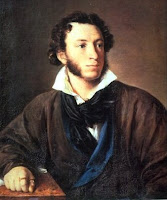A lack of sunshine + a soul debilitating commute + a hideous workload + no time for a decent run = a lack of poetry.
This is why, last night, while looking out at the rain on my way back to Connecticut on the train, I turned to one our founder's most famous lyrics.
To An Athlete Dying Young
THE time you won your town the race
We chaired you through the market-place;
Man and boy stood cheering by,
And home we brought you shoulder-high.
To-day, the road all runners come,
Shoulder-high we bring you home,
And set you at your threshold down,
Townsman of a stiller town.
Smart lad, to slip betimes away
From fields where glory does not stay,
And early though the laurel grows
It withers quicker than the rose.
Eyes the shady night has shut
Cannot see the record cut,
And silence sounds no worse than cheers
After earth has stopped the ears:
Now you will not swell the rout
Of lads that wore their honours out,
Runners whom renown outran
And the name died before the man.
So set, before its echoes fade,
The fleet foot on the sill of shade,
And hold to the low lintel up
The still-defended challenge-cup.
And round that early-laurelled head
Will flock to gaze the strengthless dead,
And find unwithered on its curls
The garland briefer than a girl's.
Although your humble author has certainly surpassed his sell-by-date for athletic glory, there may be a few things he can still accomplish in the world of words. When he can get a good night's sleep, take a walk in the woods, engineer a date, he might have more to say.
When.







